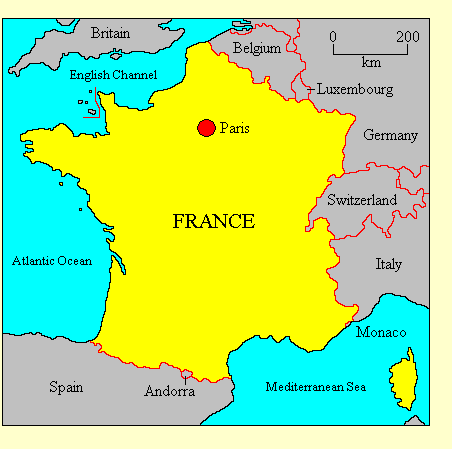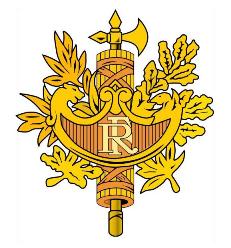

FRENCH REPUBLIC
Official name: Republique Francaise (French Republic)
• Location: Western Europe
• International organisations: Council of Europe, European Union, Group of Eight, Group of Twenty,
North Atlantic Treaty
Organisation, Organisation for Economic Co-operation and Development, Organisation Internationale
de la Francophonie, Organisation for Security and Co-operation in Europe, United Nations,
Western European Union, World Trade Organisation
• Borders: Andorra, Belgium, Germany, Italy, Luxembourg, Monaco,
Spain, Switzerland
• Coastline: Atlantic Ocean, English Channel, Mediterranean Sea
• Land area: 547,030 Km2 (Metropolitan France)
• Population: 65,100,000
• Annual GDP (PPP) per capita: US$32,800 (2009 CIA estimate). World ranking: 28
• Ethnicity: Over 90% of the population is of French stock. There is a
small Basque minority in the south-west, and some Flemish areas on the
Belgian border. There is a substantial minority of North African Arab
origin, and small minorities of African and Indo-Chinese origin.
• Languages: French is the national language and is almost universally
understood. Breton is spoken in Brittany, and Basque, Flemish and German are spoken in a few border
areas. Arabic is the most widely spoken immigrant language.
• Religion: About 85% of the population are nominal Catholic
Christians, but religious practice has declined radically. There is an
8% Moslem minority and small minorities of Protestant Christians and
Jews.
• Form of government: Presidential democratic republic. Metropolitan
France is divided into 22 regions, to which some legislative powers
have been devolved, but France is not a true federation. The regions
are in turn divided into 92 Departments. Another four Departments
(Guadeloupe, Guyane, Martinique and Reunion) are outside Metropolitan
France but are legally integral parts of the Republic.

• Capital: Paris
• Constitution: The
Constitution of the Fifth Republic came into
effect on 28 September 1958. It has been amended several times but is
unchanged in essentials.
• Head of state: The President, elected for a five-year term by
direct universal suffrage. The Constitution makes the President the
effective head of government, particularly in relation to foreign
affairs and defence.
• Head of government: The Prime Minister and the members of the Cabinet are
appointed by the President. The President can dismiss and replace the Prime Minister at will, but the Prime Minister must
have the support of the legislature, although he or she is not a member of it. If the Prime Minister loses the confidence of
the legislature the President can call fresh elections.
• Legislature: France has a bicameral legislature. The
National Assembly (Assemblee Nationale)
has 577 members, elected for five-year terms from single-member constituencies.
The Senate (Senat) has 321 members. Of these,
309 are elected for nine-year terms by electoral colleges in each Departement.
Twelve members are appointed to represent French citzens abroad. The system for choosing
Senators contains a bias in favour of the smaller, rural Departments, which favours the
conservative parties. The parties of the left have never had a majority in the Senate.
• Electoral authority: French national elections are conducted by the
Ministry of the Interior, but the
results are announced by the Constitutional Council.
• Freedom House 2011 rating: Political Rights 1, Civil Liberties 1
• Transparency International Corruption Index: 68% (25 of 178 countries rated)
• Reporters Without Borders Press Freedom 2010 Index: 86.6% (44 of 178 countries rated)
• Heritage Foundation Economic Freedom 2010 Index: 64.6% (64 of 179 countries rated)
Political history
France was an absolute monarchy until the French Revolution of 1789 destroyed its
ancient institutions in a few tumultuous years. For the next 80 years France experienced
in turn revolutionary terror, decades of warfare, an
Imperial regime under Napoleon, a monarchist restoration, several further revolutions,
a restored republic and
another Empire under Napoleon III from 1852 to 1871. Under the Second Empire some
efforts to made to establish a parliamentary government, but Napoleon ran his own
foreign policy and blundered into war with Prussia in 1871.
Military defeat led to another revolution and the final fall of monarchical
government in France. The Third Republic was founded in reaction to both monarchy and
radical republicanism as seen in the Paris Commune. It provided for a President with
reserve powers, a National Assembly elected by univeral male suffrage and separation
of church and state. France's long tradition of strong centralised government was
maintained.

The Third Republic survived the crises of the Dreyfus Affair and the First
World War, but unravelled during the 1930s as both Communists and Fascists sought to
undermine it. In 1936 the left won power, but the Popular Front government failed
dismally and left disillusionment. The Second World War led rapidly to German occupation
and the end of the Republic.
During the Second World War a collaborationist regime at Vichy brought
disgrace to France, but General Charles de Gaulle rallied resistance from London.
After the war a new constitution was written, but de Gaulle refused to accept its
provisions and withdrew from
politics. The postwar constitution extended the franchise to women.
The Fourth Republic repeated
the errors of the Third. Successive weak governments drifted into disastrous colonial wars in Indo-China
and then in Algeria. In 1958 a political crisis over Algeria brought de Gaulle back to power. He wrote a new constitution with a strong presidency, filled by himself from
1958 to 1969. Gaullism has survived as a political force, characterised by a centrist (and centralist)
domestic policy combined with assertive French nationalism in foreign policy.
Today Gaullism is represented by President
Nicolas Sarkozy and his party, the
Union for a Popular Movement, which had a
comfortable victory in the 2007 legislative elections. The other parties on the right
are the more liberal Democratic Union, and the
extreme right
National Front of Jean-Marie Le Pen.
The French left is dominated by the
Socialist Party, which was refounded in 1971 by the late Francois Mitterand and
held office for most of the period between 1981 and 1995, and its allies the
Greens and the centrist
Left Radical Party. The once powerful
French Communist Party has declined to a Stalinist
rump.
The right held power from the founding of the Fifth Republic in 1958 until
Mitterand was elected President in 1981. After Mitterand's disappointing second term, Jacques
Chirac was elected in 1995. He was an unpopular president, but he was easily re-elected in
2002 because of the fragmentation of
the left, which allowed Le Pen to come second in the first round of the presidential
election and forced everyone on the left to vote for Chirac in the second round.
The left had high hopes of returning to office at the conclusion of Chirac's
scandal-ridden term in 2007, but the left's candidate, Segolene Royal, proved an inept
campaigner and the UMP's Nicolas Sarkozy, a combative former Interior Minister, was
elected. The left was also heavily defeated in the legislative elections.
Sarkozy's nominee Francois Fillon
has been Prime Minister since May 2007.
Updated November 2011
|


